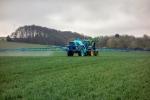H2020 IPMWORKS project: An EU-wide agricultural network demonstrating and promoting profitable IPM strategies
- Type Project
- Status Signed
- Execution 2020 -2025
- Assigned Budget 6.000.005,00 €
- Scope Europeo
- Main source of financing Horizon 2020
- Project website Proyecto IPMWORKS
Along with the promotion of organic farming, integrated pest management (IPM) is one of the tools for managing pests with low pesticide input. IPM relies on non-chemical prevention and control to reduce dependence on pesticides. This approach has been tested by very few pioneering farmers across Europe; most European farmers rely heavily on pesticides with significant environmental and social impacts. The EU-funded IPMWORKS project will promote the adoption of IPM strategies.
A European network of farmers advancing in IPM practices will help demonstrate the benefits of holistic IPM to other farmers. They will demonstrate reduced dependence on pesticides with improved pest control, lower costs, and increased profitability. The project will also organize and produce training materials. Show the project objective.
So far, a significant portion of the efforts have focused on building the network and defining and sharing the methodology. Partners in charge of launching new demonstration farm centers recruited center trainers and selected motivated farmers (either those implementing holistic IPM and using minimal pesticides or those motivated to change their pest management strategies). The NEFERTITI/FarmDemo platform was adapted to host IPMWORKS centers and publish demonstration events.
A survey was conducted to gather information from IPMWORKS farmers on their IPM awareness, adoption, and self-assessment of the efficiency and profitability of their crop and pest management strategy. It reported on farmers' motivations and actual practices and provided a baseline of on-farm pesticide use and practices.
Center trainers received in-house training on the technical aspects of IPM in different agricultural sectors and "soft skills" on how to:
- Manage a group of farmers.
- Facilitate the exchange of knowledge.
- Promote changes in pest management strategies.
The entire IPMWORKS methodology is based on previous experience from national farm demonstration networks and European projects. The project's communication channels target both external audiences (website, external newsletter, YouTube channel, social media) and internal communication. In May 2022, a FarmDemo conference was organized in Brussels, jointly with the H2020 projects NEFERTITI and IPM Decisions, providing an opportunity to present the FarmDemo methodology and tools to promote the widespread adoption of integrated pest management (IPM).
Finally, support resources were implemented in the early stages of the project. A survey of IPM stakeholders helped define the specifications of the IPM Resource Toolkit, which will facilitate access to digital resources available in Europe on IPM, including resources from previous European projects, the IPM Decisions platform, and its decision support systems, available to optimize decision-making in pest management. A first version of the IPM Resource Toolkit has been developed and tested internally.
Many project partners are also actively involved in developing training materials that will be included in external training sessions. Some partners organized initial demonstration events during the first 18 months. This core aspect of the project will primarily begin in spring 2022. Each site is expected to organize 12 demonstration events based on the daily practices of IPMWORKS farmers throughout the project (approximately 250 events).
The Farm to Fork strategy, a major component of the European Green Deal, has set the ambitious goal of halving pesticide use and its impact on agriculture by 2030. Reducing pesticide use is possible but difficult, as most farmers believe they only carry out justified treatments, based on rational decision-making, in cases where pest pressure may cause unacceptable yield losses. However, some pioneering farmers are using significantly less pesticides than others by implementing a holistic approach to Integrated Pest Management (IPM), based on combinations of non-chemical approaches, including greater use of ecologically based processes, increased diversity and biodiversity, combined with innovative technologies (robotics, precision agriculture, decision support systems, biocontrol).
The core of IPMWORKS is to coordinate these pioneering farms into an EU-wide network and organize demonstration events based on real-life daily practices on those farms, to convince the entire farming community that it is possible to reduce dependence on pesticides. Many farmers motivated by sustainable agriculture still do not fully implement holistic IPM, a consequence of decades of simplification and intensification of farming with chemical inputs.
IPMWORKS seeks to help motivated farmers who joined the network move towards holistic IPM and reduce pesticide use, thus offering a wider range of "IPM adoption success stories" to support IPMWORKS demonstration activities. Building on previous experiences, IPMWORKS proposed a specific methodology for this purpose, based on farm hubs in the same region that share the same crops, the same pest problems, and the same motivation to overcome them. The hubs are facilitated by "hub mentors," who help farmers find their own site-specific solutions and encourage peer-to-peer knowledge exchange on the functioning of agroecosystems. The Hub trainers and farmers form a European community, alongside the five pre-existing national IPM demonstration networks affiliated with the IPMWORKS network: DEPHY (FR), LEAF (UK), DIPS (DE), GROEN-AoZ (NL), and PESTIRED (CH).
This community shares the same goals and methodology, aiming to advance the adoption of a holistic IPM and convince the entire agricultural community. IPMWORKS' supporting activities include:
- Research in the humanities that provides recommendations and tools for improving working methods.
- The development of a GIP Resource Toolbox that facilitates access to digital resources available for GIP adoption.
- A defined data collection strategy to demonstrate that holistic GIP is efficient and cost-effective.
- The development of training materials for agricultural advisors.
- A communication and dissemination strategy.
Finally, IPMWORKS is preparing for the future sustainability and geographical expansion of the network with specific activities aimed at policymakers at the EU, national, and regional levels.
Integrated Pest Management (IPM) is based on a variety of pest management measures (prevention, non-chemical control, best practices to optimize pesticide efficiency, etc.). These are combined at the farm level to allow for less dependence on pesticides and, therefore, a decrease in environmental and human exposure to pesticides. A few pioneering farmers across Europe are testing these types of IPM strategies and achieving good results with low pesticide inputs.
However, most European farmers still rely heavily on pesticides, with significant environmental and social impacts, because so far most of them have not adopted a comprehensive, holistic, farm-level IPM strategy.
The objective of IPMWORKS is to promote the adoption of IPM strategies, based on an EU-wide network of farmers. These farmers will further advance IPM adoption (through peer learning and collaborative efforts) and demonstrate to other farmers that holistic IPM "works"; that is, it enables low pesticide dependence with improved pest control, reduced costs, and increased profitability. IPMWORKS will coordinate existing networks promoting IPM and launch new farm hubs in regions or sectors where IPM pioneers do not yet participate in a relevant network.
The advisors coordinating the hubs will play an important role in facilitating knowledge exchange, empowering farmers to develop their own IPM solutions, and organizing local demonstration activities. IPMWORKS will stimulate access to the 'IPM Decisions' platform and provide information on IPM methods. It will collect data to compare IPM strategies and share results and dissemination materials through channels widely used by farmers, disseminating IPM success stories. It will organize training and produce training materials, targeting both non-network farmers and advisory services, to prepare for the future dissemination of the peer-to-peer learning approach and the general adoption of IPM across the EU.
With the demonstration farm network now established and operational, IPMWORKS will become more actively involved in demonstration events and outreach activities. The approximately 250 demonstration events, based on successful IPM adoption cases, held at IPMWORKS centers and pre-existing national networks will reach thousands of farmers, demonstrating that adopting IPM is possible. Each center will produce a video for its YouTube channel, two brochures, and practice summaries. Contributions at conferences, agricultural fairs, and technical meetings will disseminate the benefits of adopting holistic IPM. A survey, planned for winter 2022/2023, will gather information on cropping systems and crop management on IPMWORKS farms and calculate indicators of pesticide use and profitability, providing quantitative evidence that IPM works when applied with all its components (including prevention methods and non-chemical control, combined with a holistic approach). The dataset will be available for reuse in future projects.
A second survey on IPM knowledge and adoption will be conducted during the winter of 2023-2024 to measure the benefits of the IPMWORKS approach (i.e., center-based training that facilitates knowledge exchange among affiliated farmers) and promote IPM adoption. Finally, policy dialogue at EU, national, and regional levels to promote the role of IPMWORKS in reducing pesticide use, external training of farmers and advisors, and a communication strategy will lay the groundwork for future network expansion beyond the project duration. The objective is to expand the number of demonstration centers and farms, as well as the network's geographical coverage to other EU Member States, in order to engage and convince more farmers to review their crop and pest management strategies and ultimately contribute to achieving the goal of halving pesticide use in Europe.
- INSTITUT NATIONAL DE RECHERCHE POUR L'AGRICULTURE, L'ALIMENTATION ET L'ENVIRONNEMENT (INRAE)






